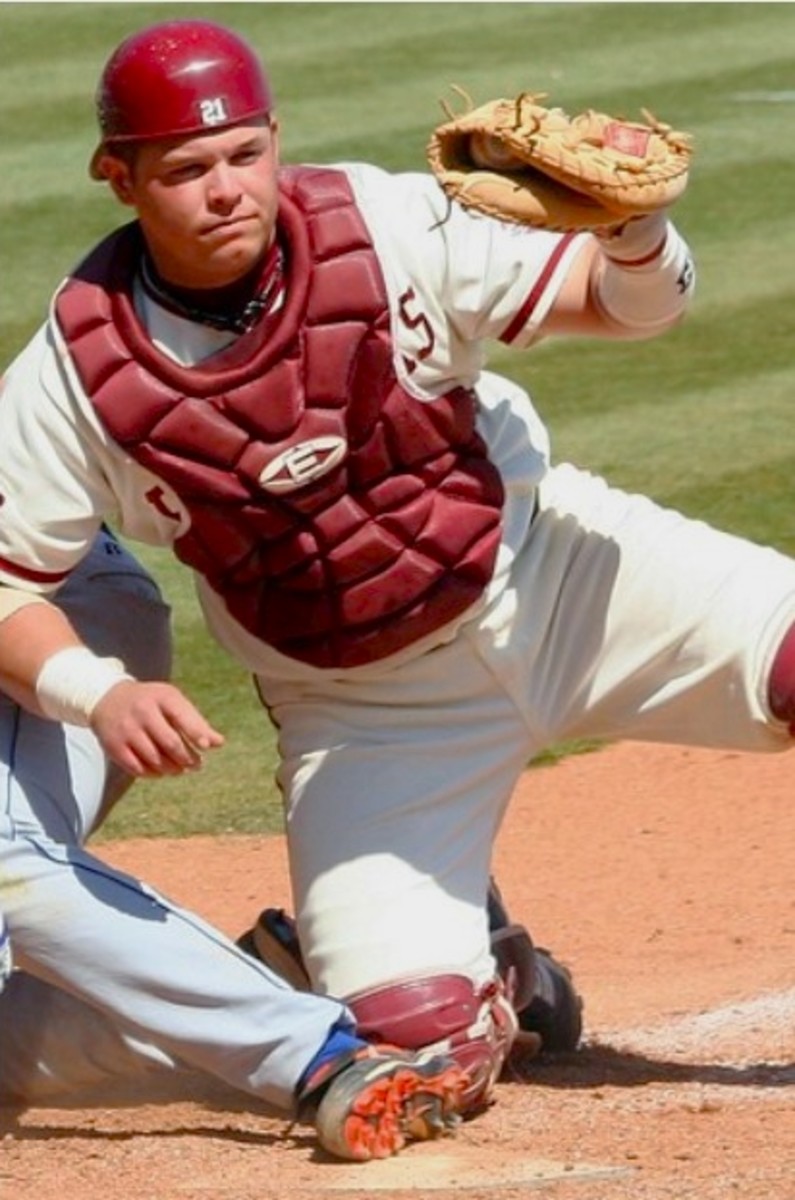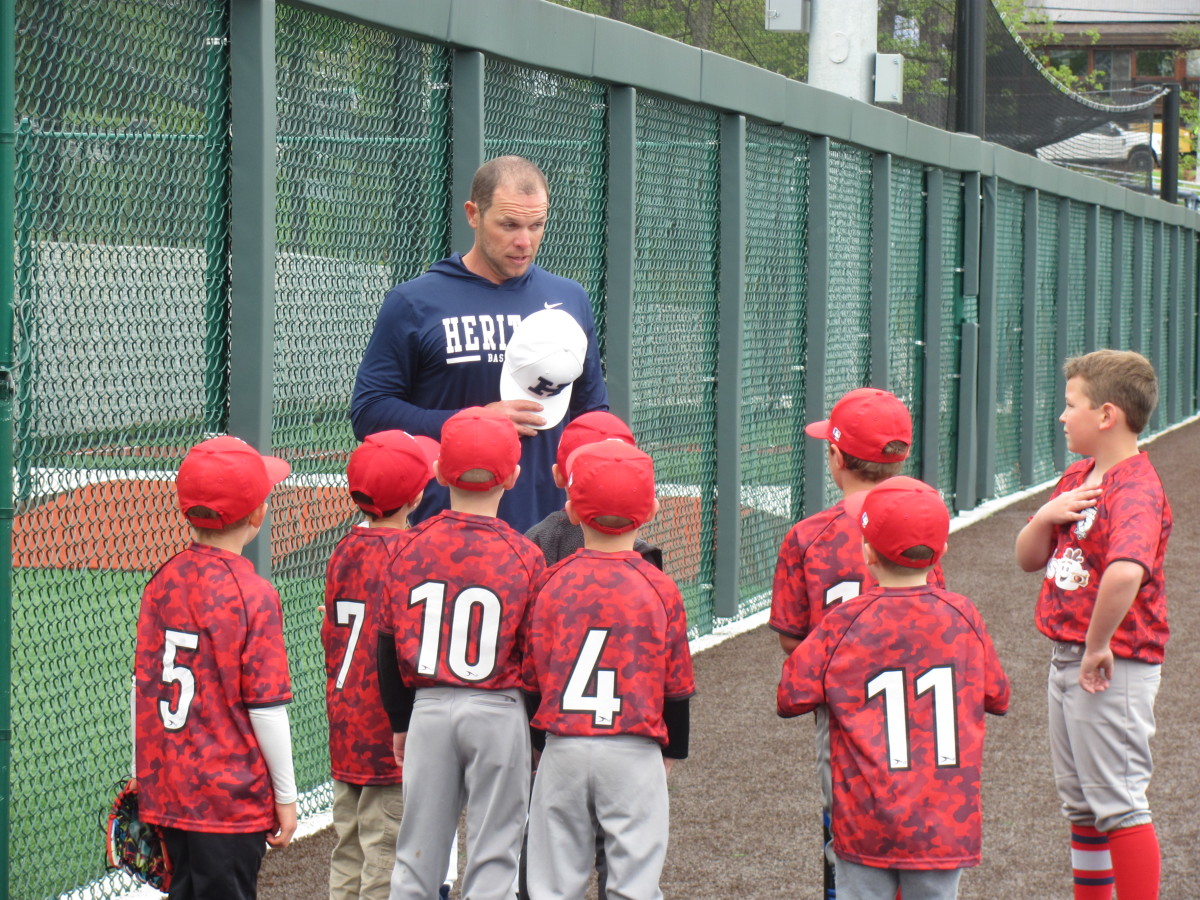Former Arkansas Razorbacks catcher Brian Walker uses ‘bad moment’ to teach players at Rogers Heritage

By Steve Andrews
Brian Walker’s most memorable performance as a catcher for the University of Arkansas baseball team is not one of his finer moments.
But now, nearly 16 years later to the day, it has become one of his finest teaching elements for guiding his young players and students at Heritage High School.
“I show it on the first day of class, every semester,” said the 36-year-old Walker, who played in Razorbacks red from 2005-07. “And the reason I do that is to teach these young people that perception is reality. Always think before you act.”
Now in his third season as the War Eagles’ head baseball coach and an oral communications teacher, not many days go by that Walker is not asked about the infamous incident that occurred on a sunny Saturday afternoon — May 13, 2006 — in Oxford, Miss.
“I believe everything happens for a reason, so it has become something I have been able to use to benefit others,” he said. “It has turned into an opportunity for me to help young people understand that you have to think things through and be respectful to the game and to others. If you don’t, you can end up with a million YouTube hits, and it will never go away.”
Actually, one YouTube clip of the incident has garnered more than 1.3 million views.
“I watch it now and I’m like, ‘What in the world was I doing?’,” he shrugged, shaking his head.

It all went down at Ole Miss’ Swayze Field, as the No. 10 Razorbacks were visiting the No. 22 Rebels in a key SEC battle. With the Rebs leading 1-0 in the top of the third inning, the left-handed hitting Walker led off for the Hogs, facing fellow lefty Brett Bukvich. With the count 1-2, Bukvich fired a fastball up and in, hoping to get Walker off balance and have him chase the high cheese.
But Walker swayed back and let the pitch go by his right elbow, before a moment later, grabbing his elbow and dancing around like he was in excruciating pain. He then began to head toward first base to a chorus of boos from the Ole Miss faithful.
Upon video review by the umpires, it was clear that the ball did not touch Walker, who then stepped back up to the plate with a 2-2 count. He struck out swinging on the following pitch and proceeded to blow a proverbial gasket, screaming and pointing at the umpire, before throwing his bat and helmet toward the dugout.
The normally mild-mannered Walker was quickly ejected. But that moment in time still lives on for all to see again and again.
“The perception of that video is that I’m a maniac, who’s out of control, and an idiot, a cheater and a fake, and all these things,” Walker said. “All those things could be true of that person, in that moment. But that is not me. That was just a bad moment for me. I had hit two home runs the night before, so I had no business faking like that. But it’s just part of my story.
“My point to these young people is that in the world we live in now, with social media and the opportunity to be videoed at any time, perception is reality. So now, if every moment can be caught on video, you better be making dang sure that you know what you are doing, and you are thinking before you act.”
Walker has become a devout mentor to his players, as he and his staff began to change the entire culture of Heritage baseball when their journey began three years ago — just as COVID-19 was starting to rear its ugly head.
Yet, over the past two seasons – since the abandoned COVID year — the War Eagle program has soared back to heights it has not seen in recent years.
After going 18-13 last season — its first winning record in five years — Heritage sits at 17-12 heading to the postseason. The War Eagles opened this season with six straight wins, then won 9 of their last 11 games down the stretch.
“We’re trending in the right direction, for sure,” Walker said. “We have spent a lot of hours as a staff. We started working them real hard to see who really wanted to be here, then just invested the time in the players and the system to make them a better team.
“The program had not won consistently before we got here. So, it was an opportunity to come in here and flip a culture that had struggled a bit. They had plenty of good-enough players. I think they just needed a mind-shift change. And I think our staff has been able to come in and create a culture of worthiness. We kind of taught them that even if we don’t always have the most talented players out there, we can work harder to close the gap to be successful and compete.”
Walker’s successful approach is just a culmination of the lessons he learned from his previous coaches, notably Arkansas’s Dave Van Horn, who remains one of his mentors of the game.
“I’ve learned so much stuff from Coach Van Horn,” he said. “Obviously, as a player playing for DVH, he taught me toughness, he taught me that day-in and day-out, you have to perform. This is a performance game, and how you feel is not necessarily relevant at that point. Bottom line is you’ve got to perform.”
After serving two years as a team captain for the Razorbacks, Walker was drafted by the Anaheim Angles in the 29th round of the 2007 draft. The Tulsa native spent four years in the Angels’ organization, making it as high as Triple-A and including three stints with the Double-A Arkansas Travelers in North Little Rock.
He returned to Fayetteville in 2011 and joined Van Horn as the Arkansas catching coach and was instrumental in the development of current New York Mets catcher James McCann. Again, the lessons learned from Van Horn were immeasurable.
“As a coach, I got to watch how he operated, how he handled players and how he handled the staff,” Walker said. “He would let us coach, but he was always aware of what was going on. He was just what you would call a great CEO of the company.”
After former Razorbacks hitting coach Todd Butler took the head-coaching job at Wichita State, Walker soon followed in 2014 and assisted the Shockers for five seasons.
“In the professional ranks I was able to be around guys like Mike Scioscia and a lot of great managers and coaches,” he said. “Then the three years under DVH. Then to Wichita State for four years with Coach Butler, who I also take a lot of the philosophies that he taught me. So, I’ve just been very fortunate to be around some great baseball men, which has allowed me to use all of their things to find my own success.
“Moving forward, I have tried to take those lessons and find a way to adapt them to 14-to-18-year-olds. And it has worked here faster than I even thought it would. We talk a lot about falling to the lowest level of training, so if our lowest level of training is higher than the other team, then we have a good chance to be successful.”

When his limited time permits, Walker enjoys taking his kids back to his old stomping grounds, Baum-Walker Stadium, to watch the Razorbacks. He also continues to have a close relationship with Van Horn.
“I’m very appreciative of everything he has done for me,” Walker said of his old coach. “Although I really didn’t understand at a young age the impact he was going to have on me — to not only play for him but to be a part of his coaching tree and learning so many great lessons about baseball and about life.
“Baum-Walker is a great atmosphere and it’s amazing how much it has grown through the years. And just what a wonderful job DVH and all the coaches and players that have come after me have done there.”
He met his wife, McKenzi (Ellis), a Fayetteville native, while attending college. She was an RBI Girl (cheerleader) for the Hogs, while also serving as an occasional babysitter for the Van Horn children.
The couple now has four kids of their own: 13-year-old fraternal twins, Joseph and Clair; 6-year-old Ryan; and 4-year-old Hannah.
And, of course, he also serves as a pseudo father figure for the 29 young men on the Heritage baseball team who have bought into Walker’s leadership and philosophies.
“Baseball is my avenue to be able to help them grow in the real world,” Walker said. “I want to see these young men graduate, get an education and get a good job. I want to see my guys go on to be successful human beings who understand what hard work is, what being a husband looks like, what being a father looks like, and prove that they can go out and impact the world in a positive way.”
The coach had to fight back some emotions during last week’s Senior Day, when the War Eagles defeated cross-town rival Rogers, 4-1, the No. 1 team in the SBLive Super 7 Class 6A rankings. The pride was evident as he was able to honor seven seniors who have earned scholarships to play at the collegiate level.
“This is a special group, who has been through the thick and thin with me. They’ve stood by me when times have been tough,” he said. “These guys have persevered and set the standard for what Heritage baseball stands for, and what it’s going to be, moving forward. Their impact will be felt for so many years to come.”
Three of his pitchers will be taking the next step, as Coleman MacRae will play at Central Arkansas, Brady Laird will attend Arkansas Tech, and Aden Almeida is going to UA-Rich Mountain Community College. First baseman Quentin Edwards is headed to Parsons, Kan., to play at Labette Community College, while catcher Cade Nickel will attend Southwest Baptist in Bolivar, Mo. Second baseman Michael Johannsen will attend Southern Arkansas University, and outfielder Tyler Jouett will play at South Arkansas Community College.
“If they tell me they want to play at the collegiate level, I will do whatever I can do to help them get there,” Walker said. “I’m excited for them, because who knows what kind of doors it can open up for them down the road. Just to see their progression as players and as human beings is the pinnacle of this job.”
Walker is happy with where his career and his program are at this point and is unsure if he might want to give the collegiate level another try down the road. For now, he’s content as a family man and a high school baseball coach, taking it one day at a time.
“I’m happy and thankful for where I am right now,” he said. “Both my sons are here with me almost every day, my daughters, my wife are here. You can never say never, but I’m happy where I’m at. If a better opportunity happens to arise somewhere down the road, then I will make a decision at that point.”
